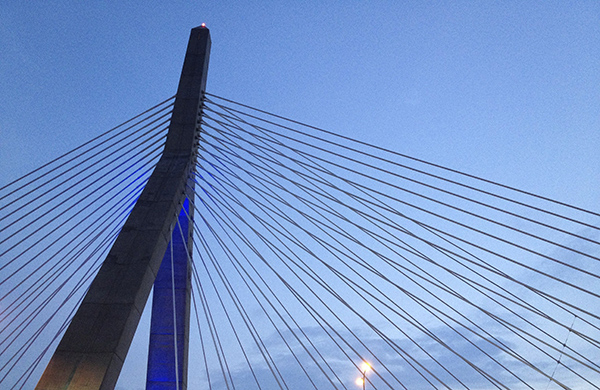
There are some images that anchor you to a specific place – the Eiffel Tower and the Arc de Triomphe signify Paris, the Statue of Liberty stands in for New York. In Boston, there are a few specific sights that create that sense of locale. For me, those icons include the Citgo sign (of course!), and the Zakim Bridge.
As the Boston Globe reported last year, bridges hold a special place in our hearts, and inspire strong emotions of love or hate. In fact, several local bridges are reviewed on Yelp and TripAdvisor! As the Boston Globe article notes, we need bridges to travel from place to place, but they are also opportunities to appreciate the sunset over the water, a glimpse of the city skyline, and a connection to history.
Soaring into the sky between Charlestown and the North End, the Zakim Bunker Hill Memorial Bridge feels simultaneously strong and airy. It was dedicated to the memory of both the battle against the British at Bunker Hill (which took place in nearby Charlestown), and Leonard P. Zakim, a local civil rights activist. It is the widest cable-stayed bridge in the world, and the design reflects the shape of the nearby Bunker Hill monument.
The Zakim not just my favorite – it boasts a 4.5 out of 5 on Yelp and TripAdvisor! Here are a few choice excerpts from the rave reviews: “It changes colors at night and makes me feel like I'm driving on a paved rainbow to something better on the other side.” “This bridge is gorge. I really like that it combines history with modernity - which is what I think Boston is as a city. It hints at our past with the two towers that mirror the nearby Bunker Hill Monument, but it is also a sign of progress.” And finally, “This is a cool bridge. Period.” I agree.
The bridge was built as part of the Big Dig, and beloved activist Lenny Zakim had recently died of myeloma. The city was inspired to name the bridge after him in remembrance of his work to bring together people of different races, religions, and socio-economic backgrounds. As the director of the Anti-Defamation League in New England, Zakim was dedicated to fight prejudice of all kinds. During his five-year battle with cancer, he advocated for patient access to integrative therapies, and a center named for him at Dana-Farber is now fulfilling that mission.
As an icon of Boston, the Zakim bridge speaks to Boston’s past as the center of a revolution and the cradle of a nation, as well as the continuing refinement of that vision towards a more just society. It also captures the imagination of visitors and locals alike, whether lit up at night or framing the morning sun. As the gateway to the city that we love, the Zakim links Boston’s past and present.








